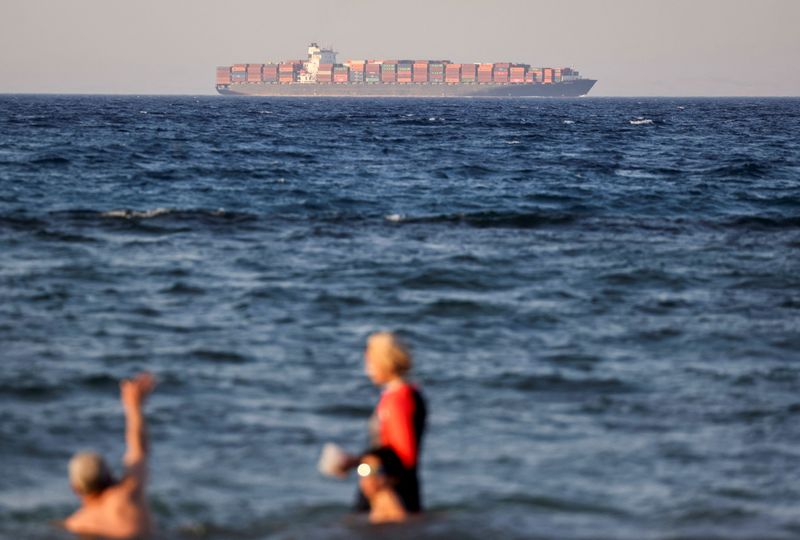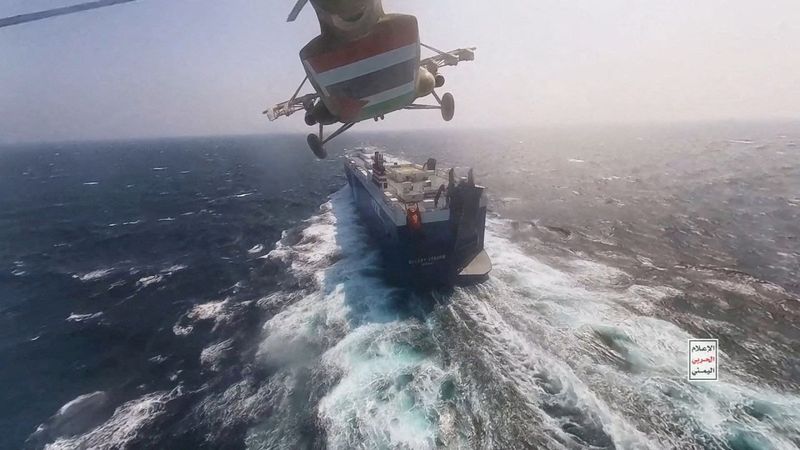By Siddharth Cavale and Helen Reid
NEW YORK/LONDON (Reuters) - Retailers worldwide are stocking up on goods before China's Lunar New Year holiday and seeking air or rail alternatives to transportation via the Red Sea in a scramble to avoid empty shelves this spring, executives and experts told Reuters.
One European retailer said it was delaying marketing campaigns for some specific goods until stocks were secured.
Major container ship operators like Maersk and Hapag-Lloyd are re-routing vessels away from the Suez Canal - the shortest route from Asia to Europe - after militant attacks on vessels in the Red Sea.
The diversions have raised fears of another prolonged disruption to global trade just as supply chains unsnarl after the COVID pandemic. Going around southern Africa instead adds $1 million in fuel costs and about 10 days to the journey.
Interviews with five retailers selling everything from furniture to mechanical components, and with analysts, show the unusual steps companies are taking to adapt.
U.S.-based BDI Furniture is front-loading orders and relying more on factories in Turkey and Vietnam. It is also asking freight brokers to bypass the Panama and Suez canals and ship goods across the Pacific Ocean to California, where they can be transported by rail to its east coast U.S. warehouse.
Hanna Hajjar, vice president of operations at BDI Furniture said it has low stocks of some media cabinets, bedroom and office furniture that are already on ships.
"We just did not expect all these recent delays," he said, adding that the disruptions have lengthened transit times from Vietnam by 10-15 days.
Companies transporting goods from China to Europe and the United States are considering alternatives like rail and air, but high prices mean they have to be strategic about which products to prioritise.
Hajjar says BDI is using the California route as a solution on a case-by-case basis because rates are now double the normal cost of shipping through Suez or Panama.
Even though Asia-to-Europe trade is most exposed to the Suez disruptions, as much as 30% of shipments to the U.S. East Coast move via the canal.
RACE AGAINST TIME
Retailers are also in a race against time: on Feb. 10 factories in China close for anywhere from two weeks to a month for the Lunar New Year holiday, so companies typically try to export as much as possible beforehand.
But with vessels rerouted, fewer ships will be back in China in time to load cargo before the holiday. That means likely delays to products meant to land on Western shelves in April or May. Logistics experts are already reporting a container shortage at Ningbo port in China.
"The worst thing to happen to a retailer is having a significant delay on a product that they won't be able to market because of seasonality," said Rob Shaw, general manager for EMEA at inventory software company Fluent (NASDAQ:FLNT) Commerce.
Europe's Aldi Nord said it may receive items like household goods, toys and decorations later than planned, and is postponing the advertising of specific products as a result.
Britain's Next said the delays were manageable compared to those during the pandemic. But the retailer, which sources most of its products from Asia, could mitigate this through earlier ordering and using more air freight.
"The lessons (from COVID) are on stock being delayed - order a little bit earlier and allow for a little bit more air freight," CEO Simon Wolfson told Reuters.
One option is a rail route from western China to eastern Europe.
Craig Poole, UK managing director of Cardinal Global Logistics, said the cost of using it has jumped to around $9,000-$10,500 per 40-foot container from around $7,000 in November, and is increasing daily.
IC Trade, which exports mechanical components from China to Italy, is exploring the rail option but "it's not easy to find the space," said founder Marco Castelli. "To make up for one vessel, you need 100 trains."
Polish fashion retailer LPP said it is considering rail or sea-air alternatives for its "most urgent" collections.
RBC analysts said continued disruptions could hurt European retailers' gross profit margins, while the prospect that fresh supply chain strains will push up prices has raised fears of another bout of global inflation.

For some companies, the latest disruptions highlight the need to permanently shift supply chains so factories are closer to the end consumer, a process often called "near-shoring".
BDI Furniture aims to cut its dependence on China to 40% of total orders over the next two to three years from 60% currently, by sourcing more from Vietnam and Turkey.
